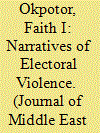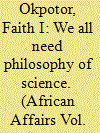|
|
|
Sort Order |
|
|
|
Items / Page
|
|
|
|
|
|
|
| Srl | Item |
| 1 |
ID:
175827


|
|
|
|
|
| Summary/Abstract |
This article addresses post-election violence (PEV) in Africa by drawing on the lived experiences of respondents in Côte d’Ivoire and Nigeria. It takes an actor-centered approach steeped in interpretivism and reflexivity in analyzing Côte d’Ivoire’s 2010–2011 and Nigeria’s 2011 PEV. It examines PEV from the viewpoint of a variety of actors, including political party leaders, party activists, electoral commission officials, non-governmental organization (NGO) officials, academics, scholars, and human rights experts. With attention to methodological and personal positionality, the study draws on interviews conducted in 2014 and 2015. It also analyzes the dominant discourses that contributed to a violent reaction to a contested election outcome, and thus highlights the socially-constructed conditions that allow for the possibility of violence. Salient issues arising from these narratives include: the role of decades-long unresolved violence episodes in fueling PEV, the role of political leaders in exploiting grievances associated with these past violence episodes, and the power of electoral violence prevention strategies targeted at principal actors in curbing the progression to violence.
|
|
|
|
|
|
|
|
|
|
|
|
|
|
|
|
| 2 |
ID:
178097


|
|
|
|
|
| Summary/Abstract |
Explaining and Understanding are considered mutually exclusive in political research. In this view, Explaining involves making observations as an outsider, with emphasis on causal laws, generalizations, and predictions. Conversely, Understanding occurs from the inside, with emphasis on meaning-making. This research note addresses Explaining, Understanding, and the related concept of reflexivity in multi-method/mixed-method research involving fieldwork. Rather than taking for granted the dichotomy between Explaining and Understanding that stems from Cartesian anxiety, I argue for the non-mutually exclusive alternative of ‘explanatory understanding’ and propose analyticism as the appropriate methodological path. An analyticist methodology involves creating a model that is a general account of a phenomenon, which is then used in case-specific analytical narratives to reveal departures from the model. Since understanding requires adequate explanation, explanatory understanding helps us better make sense of the world. Therefore, Explaining and Understanding are not merely oppositional stances between identifying causes and making sense. We cannot identify causes without making sense, and making sense involves a degree of causal inference. Explanatory understanding also necessitates reflexivity, which I conceptualize as methodological and personal positionality. I apply these arguments to my study of post-election violence in West Africa, drawing on fieldwork experience in Ghana, Nigeria, and Côte d’Ivoire.
|
|
|
|
|
|
|
|
|
|
|
|
|
|
|
|
|
|
|
|
|